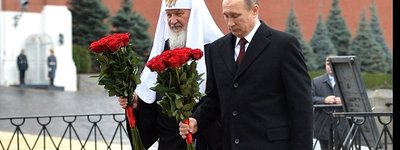Has the Orthodox “Symphony” Reached its Coda?
In his new bookNelmondoma non delmondo: sfide e tentazionidella Chiesa ortodossanelmondocontemporaneo (“In the World but not of the World: Challenges and Temptations of the Orthodox Church in the Contemporary World”)(Magnano, 2016), the young Greek theologian Dr. PantelisKalaitzidis, director of the Volos Academy of Theological Studies in northern Greece, questions traditional Orthodox attitudes towards church and state. Last month, the semi-official Vatican newspaper Osservatore Romano published excerpts from the book’s preface,by Luigi d’AyalaValva (a monk of the Bose monastery in Italy), and from the text itself (“Una perversionedell’elemosina,” 20 October 2016, p. 5, reported in Catholic World News, 20 October 2016).
The Preface promises a work that goes beyond the stereotypical Western views of Orthodoxy, written by“one of the most original and courageous voices of the new generation of Orthodox theologians.” Indeed, Dr. Kalaitzidis has written many works on modern Orthodox theology, post-modernism and post-secularism, religion and politics, ecclesiology and nationalism. The current work treats a broad range of topics, including the church’s relationship to culture, national identity, ecumenism, reform, human rights, and gender.
In the published excerpt, Dr. Kalaitzidis stresses the radical nature of Christianity, whose martyrs defied the Roman state as it proclaimed “a kingdom not of this world.” And yet, he recalls,later Christians in both East and West have tried to associate the church with the state, hoping to make the state Christian, so that the faith and its morals might become legally obligatory for all. Kalaitzidis recounts the many negative effects of these attempts. He praises those who resisted the fusion of church and state, pointing to the many instances where the church remained apart, such as early monasticism, and where it criticized state behavior, such as the Church fathers’ concern for social justice, and Gregory of Nyssa’s opposition to usury.
In an apparent digression, the author cites the “perversion of alms,” where an almsgiver is the source of the injustice that causes the poverty he is attempting to relieve. He cites a fourth-century canon forbidding bishops to accept alms from wealthy exploiters of the poor. In Christian thought, Kalaitzidis reminds us, poverty is sacred, andthe poor and the weak -- that is, those who do not identify with wealth and power -- are thetrue friends of God. Does this mean that the Church should shun those who engage in politics and big business (who are often the same people)? One can only imagine the implications of such a principle for the churches in Ukraine and their oligarchic benefactors. And not only in Ukraine.
Kalaitzidis points out that today, the modern state is secular and pluralistic, with an aversion to religious authority. Contemporary Europe, after all, is post-Christian. He acknowledges the secular, lay character of the state, and favors its separation from the church. It is time, he writes, for the Orthodox to understand that the traditional Byzantine “symphony of powers,” the harmonious alliance of church and state, is no longer a model to follow. Kalaitzidis is skeptical of the notion that the Church can Christianize the state: he does not believe that one can transform biblical texts, such as the Sermon on the Mount, into principles of state governance. This, indeed, would carry the risk of a reverse effect: of secularizing the evangelical message itself, bringing back memories of theocracy and religious totalitarianism.
Today, “secularization” also refers to the de-Christianization of society and culture. How does that affect the relationship between church and state? Given a secular society as well as a secular state, the Church is left independent of both.
It is generally acknowledged, however, that this in no way diminishes the need of both state and society for the church. In a recent book on religion and violence, for example, the British philosopher Rabbi Lord Jonathan Sacks argues that liberal democracy cannot answer the most important questions of humanity. Only religion can do so. He predicts, therefore, that the twenty-first century will see a turning of the tide, as the secularization of the last four centuries yields to de-secularization. He also points out that compared to the modern state and political institutions, religion is better suited to using the new means of instantaneous global communication that practically define our era. In fact, Sacks believes that in today’s world, the state is becoming less important, while religion is becoming more so. (Jonathan Sacks, Not in God’s Name, London, 2015, chapter 1).
If both Kalaitzidis and Sacks are right, then the separation of the Orthodox churches from their states would benefit them. Untethered from declining secular structures, they could truly flourish, even beyond the borders of their countries.
Why is this of such interest to the Roman Catholic Church that the Osservatore Romano should publish an excerpt from Kalaitzidis’ book? Perhaps it is because one of the obstacles to Catholic-Orthodox ecumenism has been the interference of various national states, and their political agendas, in the process. Should the Orthodox churches free themselves of state control, their ecumenical relations with the Catholic Church would benefit.
What do the thoughts expressed by Dr. Kalaitzidis in this excerpt imply for the Ukrainian Orthodox Churches? Given the historically close church-state relationship in Russia, it has been only natural for the Ukrainian Orthodox Churches to adhere closely to the independent Ukrainian state. Recent acts and statements by Ukrainian political figures and by Parliament underscore that relationship. Should it be severed? Given the experience of the Russian Orthodox Church, and many Ukrainians’ critical view of its political role, the answer would be yes. Whatever the benefits of a state church may have been for Orthodoxy in Ukraine, the negative consequences appear to have been far greater. Indeed, during the great revival of Orthodoxy in Ukraine in the early 1600s, there was no Ukrainian state, while during its subsequent revival in the 1920s, the state was strictly separate.
But it has also been natural for the Ukrainian Orthodox Church of the Kyiv Patriarchate, and the Ukrainian Autocephalous Orthodox Church, to identify closely with the Ukrainian nation. Would severance from the Ukrainian state also mean detaching Ukrainian Orthodoxy from its national roots?
Not at all. The nation is not the state. A firmly Ukrainian Orthodoxy, freed of state supervision and political ties, would flourish. While nationalist ideology certainly poses problems for any Christian church – the Greco-Catholic church is an example – national identification helps to keep the church with the people – to speak its language, both literally and figuratively. In fact, national identification can help Ukrainian Orthodoxy to extend beyond the borders of the state, taking advantage of religion’s ability (pointed out by Rabbi Sacks) to spread by means of modern global communication, and reaching Ukrainians wherever they might be found.
The symphony of church and state, then, may be nearing its end. But it may turn out to have been only an overture to the grand drama of Orthodox revival.










